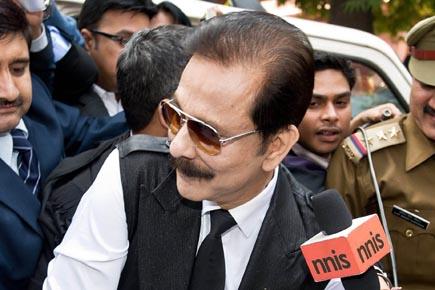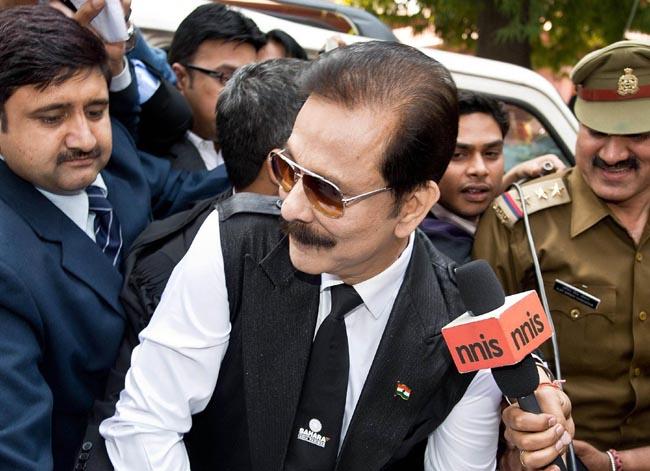The Supreme Court on Thursday says that Sahara Group chief Subrata Roy has been sent to jail for ensuring compliance with its order to return investors money

New Delhi: The Supreme Court Thursday said that Sahara Group chief Subrata Roy has been sent to jail for ensuring compliance with its order to return investors money collected by two group companies through optionally fully convertible debentures.
ADVERTISEMENT

Sahara Group chief Subrata Roy Sahara. File pic
Making a distinction between Roy's ongoing custody and punishment for contempt now being heard by it, a bench of Justice K.S. Radhakrishnan and Justice Jagdish Singh Khehar said: "Our order of March 4 is for the enforcement (of Aug 31, 2012 and subsequent orders) and not punishment (for contempt). Each para is for the enforcement and nothing to do with punishment."
"We will deal with the punishment after the order (to return investors money) has been complied with," said Justice Khehar.
Roy meanwhile urged the court to modify its March 26 order asking him to deposit Rs.10,000 crore - Rs.5,000 crore in cash and Rs 5,000 crore in bank guarantee from a nationalised bank - with its registry for his release.
At the outset of the hearing, senior counsel C.A.Sundaram sought the order's modification, saying that Sahara chief be allowed to deposit Rs 2,500 crore in the first instance, another Rs 2,500 crore within 21 days and get 60 to 90 days for arranging the bank guarantee for the balance.
The court was also asked to allow Roy to stay under house arrest instead of his continued detention in Tihar jail. Senior counsel Rajiv Dhawan told the court that it would facilitate Roy meeting people for arranging the finances for his release.
"You have money in thousands of crores.. that too in cash. It is just Rs 10,000 crore," the court observed as Sundaram pressed for an early hearing of the application Friday.
Saying that it was in hurry, the court said: "We may decide (challenge to March 4 order) in your favour. Of all what you know. We are in a hurry."
The court sought to erase the impression that the condition of Rs.10,000 crore was some kind of bond for securing release from custody. Justice Khehar said: "....suggestion is made Rs.10,000 crore is bail bond. It is not right. It is a part payment towards principal amount. This is to establish your bonafide to be released."
Meeting the pleas by Roy's lawyers that he was not told the charges against him and why was he was being sent to jail, counsel for market regulator SEBI, taking the court through its various orders and conflicting submissions made by Sahara, said that it was the "cumulative conduct of Roy in defiance of the court's several order" that led to March 4 detention order.
Referring to the apex court's earlier judgments, its rules on sending a person to detention before charges were determined and British cases, senior counsel Arvind Dattar argued that the "power to send a person to detention pending determination of the charge is not unknown to law".
Offering to accept Sahara's contention that the investors money has already been paid, he said that all it has to show "where is the payment, when you paid and how you paid".
Dattar said that if Sahara is able to demonstrate this, then the two things left for the contempt case to be decided would why payments to investors were made in cash and why the redemption of OFCDs continued even after Aug 31, 2012.
The court said it had stayed the SEBI order on refunding the investors money but there was no modification of the order that investors money should be paid by cheques or demand drafts only.
At this, Sahara's counsel Srinivasan Ganesh intervened and said that there was no order prohibiting them from refunding the investors money but the SEBI said even if there was not, the refunds should have been done by cheques.
But Justice Khehar observed there was no modification of the order and no such modification was sought even as Ganesh sought to underplay it.
Dattar also drew the attention of the court that even when the two group companies - SIRECL and SHICL - sold their assets to sister concerns in the group, the outflow and inflow should reflect in their banking transactions.
The court directed the matter's further hearing April 9 when it will also take up Sahara's application for modification of its March 26 order.
 Subscribe today by clicking the link and stay updated with the latest news!" Click here!
Subscribe today by clicking the link and stay updated with the latest news!" Click here!






